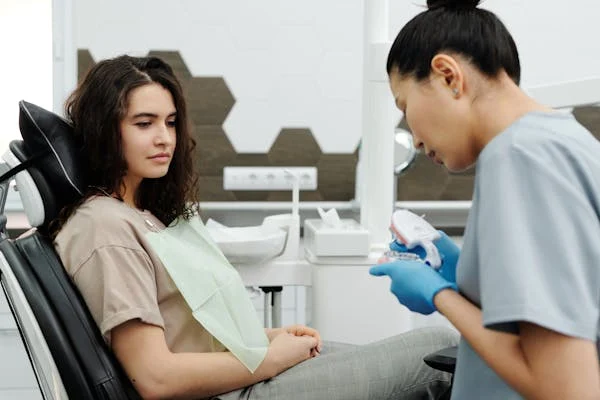
Good dental hygiene is essential for maintaining not only a bright smile but also overall health. As one of the most trusted dentists in High Wycombe, I often get asked by patients about how they can improve their dental care routine to prevent issues like cavities, gum disease, and bad breath. While regular visits to your dentist are vital, what you do at home plays a critical role in ensuring the health of your teeth and gums.
Here are some key dental hygiene tips that can make a significant difference in your oral health:
Brush Your Teeth Properly
Brushing your teeth is the foundation of good oral hygiene. It’s important to brush your teeth twice a day—once in the morning and before bed. Use a soft-bristled toothbrush and fluoride toothpaste to help remove plaque and food particles.
The key to effective brushing lies in the technique. Hold your toothbrush at a 45-degree angle to your gums, and use gentle, circular motions. Avoid harsh scrubbing, as it can cause gum recession and enamel wear. Don’t forget to brush your tongue as well, as it can harbor bacteria that contribute to bad breath.
Make sure to replace your toothbrush or electric toothbrush head every three to four months. Worn-out bristles will not clean your teeth effectively.
Floss Daily
Flossing is often overlooked but is just as important as brushing. Brushing alone cannot remove plaque and food particles from between your teeth and along the gum line. Flossing daily helps prevent gum disease, cavities, and bad breath by cleaning these hard-to-reach areas.
To floss properly, gently slide the floss between your teeth, curving it around each tooth in a “C” shape to clean below the gum line. Be gentle to avoid injuring your gums. If you struggle with traditional floss, you can use floss picks or an interdental brush.
Use Mouthwash
Mouthwash can be an excellent addition to your oral hygiene routine. A good mouthwash can help reduce plaque, prevent gum disease, and freshen your breath. Look for a mouthwash that contains fluoride for added protection against tooth decay, or one that has antibacterial properties to fight gum disease.
Mouthwash is not a substitute for brushing and flossing, but when used as an adjunct, it can provide an extra layer of protection.
Maintain a Balanced Diet
What you eat plays a significant role in your dental health. A diet rich in vitamins and minerals, particularly calcium and vitamin D, helps keep your teeth strong. Foods such as dairy products, leafy greens, and fish are excellent choices for maintaining healthy teeth.
Limit your intake of sugary foods and drinks, which can lead to tooth decay. Sugary snacks create an environment for harmful bacteria to thrive in your mouth, leading to cavities. If you do indulge in sugary treats, try to brush your teeth afterward, or drink water to help rinse your mouth.
Stay Hydrated
Drinking plenty of water throughout the day is not only important for your overall health but also for your dental hygiene. Water helps wash away food particles and bacteria, reducing the risk of plaque buildup. It also stimulates saliva production, which naturally protects your teeth by neutralizing acids and remineralizing enamel.
Opt for water over sugary drinks, which can lead to tooth decay and dehydration.
Don’t Ignore Gum Health
Your gums are just as important as your teeth when it comes to oral hygiene. Gum disease is one of the leading causes of tooth loss, but it’s preventable with proper care. Brushing, flossing, and using mouthwash are all important for keeping your gums healthy.
If you notice signs of gum disease, such as red, swollen, or bleeding gums, seek dental advice promptly. Early intervention can prevent more serious issues down the line.
Visit Your Dentist Regularly
Even with excellent at-home care, regular visits to the dentist are crucial for maintaining optimal oral health. Professional cleaning removes plaque and tartar that may have built up despite your best efforts. Your dentist will also conduct a thorough examination to check for early signs of tooth decay, gum disease, or other oral health issues.
It’s recommended to visit your dentist every six months for a checkup and cleaning. If you have specific concerns or dental issues, your dentist may recommend more frequent visits.
Don’t Smoke
Smoking has detrimental effects on your oral health. It can cause gum disease, tooth decay, bad breath, and even oral cancer. Smoking also reduces the effectiveness of your immune system, making it harder for your body to fight off infections in your gums.
Quitting smoking will significantly improve your oral health and overall well-being.
Conclusion
Good dental hygiene isn’t complicated, but it does require consistency and attention. By brushing and flossing correctly, maintaining a healthy diet, staying hydrated, and visiting your dentist regularly, you can significantly reduce your risk of developing dental issues. If you’re looking for a trusted dentist in High Wycombe, don’t hesitate to contact us for a consultation and more personalized advice. Your smile is worth the effort!
By following these dental hygiene tips, you’ll not only protect your teeth but also improve your overall health and confidence. Make your dental care a priority today for a healthier tomorrow!
